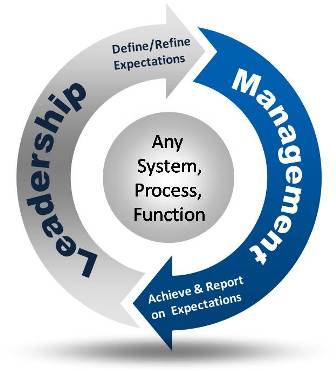The acronyms associated with BPM seem to grow in quantity year by year while the essence behind them grows at a much, much slower pace. If we cut through all the jargon, we can get to the simple truths. In this article, we’ll discuss one such fundamental truth – business requires both leadership and management to succeed. You can’t overlook or over-value one or the other; they have a symbiotic relation in any business, business function or business process.
You Must Lead Before You Can Manage (BPL before BPM)
There are many definitions of leadership and management; but none have been designated as the “generally accepted standard” across vocations. So for this article we will use the common saying:
‘Leadership is doing the right things, Management is doing things right’
There are two critical words in this definition- Doing and Right. Without doing (action), nothing happens. But in order for the doing to be right there must be some definition (agreement) that can be used to gauge it’s rightness. Whether these gauges of rightness are called success criteria, organizational goals or expected targets, the simple truth is that you can’t manage anything before its purpose and expectations are defined by the leaders. No implementation of BPM methodology, tool or practice can be successful without applying this concept. Yet, so many jump right into the implementation without forcing the leaders to do the work of defining what is right.
When we speak of leaders we mean the person or persons whose responsibility it is to decide the mission, vision, goals and strategies for the process and organization that process resides in.

Figure 1: Leadership Management Cycle
Defining What is Right
Defining what is right is the critical and necessary work of leaders. How else can management determine if the doing is going in the right direction? Even the old Ready, Fire, Aim strategy or approaches involving prototyping require some definition of what is considered right so they can be effectively managed (e.g., scope, purpose, constraints, desires, etc). Sure, you can ‘just do it’ but then there is no need (or possibility) of management, much like any one can sail a boat if they don’t care where the winds take them.
Leaders of a company must use the same practices and tools to define what is right for each business process as they do for each function. We’re comfortable with leaders organizing the business around functions (i.e., IT, Finance, HR, Manufacturing, etc.)and paying functional managers for compliance with agreed to criteria for success – usually defined by a combination of behaviors within their job description and organizational policies with metrics/expectations around resources, finances, capital, sales, revenues, market share, new products development and/or operations, etc..
Yet business processes are often cross-organizational making any definition of what is right and who will manage the process much more complex. This takes great vision, persistence, motivation, synthesis, and analysis – which is clearly the work of the leaders, not managers.
And so begins Business Process Management
Once expectations are set, you are ready to manage. As shown in Figure 1, how you choose to pursue BPM is quest which will include monitoring, identification of deviations, evaluation of alternatives to correct those deviations, and action (doing one or more alternatives to meet expectations). Some call this cycle “Monitor and Control” others “Execution”. You can call it whatever you want, but it boils down to simply describing the acts necessary to do things right, usually referred to as management.One key element often overlooked in the management cycle is the adjustment of process expectations. Rather than continually striving to change the process to meet the originally stated expectations, consider reassessing expectations to meet the process capabilities and constraints. Often your leaders didn’t have enough information to properly develop the expectations or didn’t realize the requirements to meet them. Providing regular feedback is a critical part of any management cycle. As a manager of a function or process, this feedback will allow your leaders to better manage expectations. This is often referred to as Business Intelligence (BI) and/or Business Process Improvement (BPI). This feedback /reassessment loop is a standard part of many processes in place within organizations today – budgeting, performance evaluations, projects, etc. – and should be equally applied to functional and process management.
Time and Time Again
While society and business continue to grow at a fast pace, the art and discipline of leadership and management grow very slowly despite the rapid change in the intelligence and technologies we can apply to each. Just compare some of the features of today’s great buildings – climate controlled, security, and stability – to those castles and buildings of the past. You realize how far we advanced. But if you take some time to investigate how human beings led and managed these great creations, you’ll find the cycle of leadership and management has changed little.
Even if some new management approach or tool is developed, it will be many, many years before they can be successfully applied. Just look at how long it took great leaders of change from recent history to actually see those changes implemented (e.g., Lincoln, King, Einstein, etc). So stick to the time tested cycle of ensuring that your leaders lead before your managers manage. Both leadership and management are required in order for either to succeed.
But if you’re addicted to acronyms, you can just say BPL is necessary for BPM which feeds BI to better enable BPL to perform BPI.

















